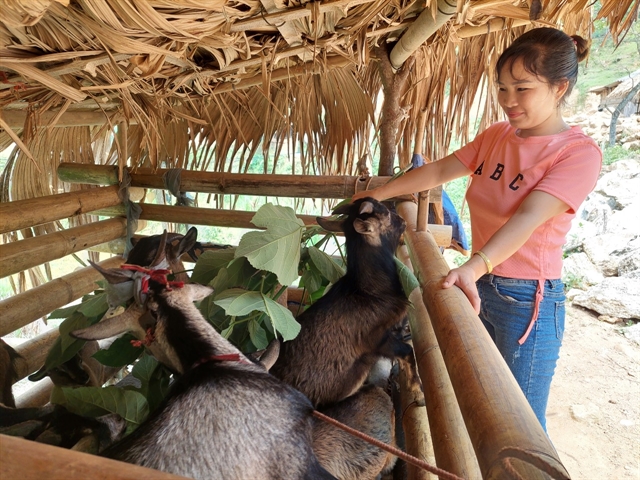 Society
Society

 |
| Trương Thị Nhầu takes care of her goats. — VNA/VNS Photo Tạ Nguyên |
HÀ GIANG — Thanks to capital support and guidance on livestock farming models, many ethnic women have gradually escaped poverty.
A typical example is Trương Thị Nhầu, an ethnic Dao woman.
She lives in Hồng Sơn Village, Tiên Nguyên Commune, a very poor commune of Quang Bình District in the northern mountainous province of Hà Giang.
Nhầu said that two years ago, her family was almost empty-handed and had no capital to start a business.
“We only had two buffaloes and in August 2022, both of them were swept away by floods. My family had no assets, while the loan to buy the buffalo had not been paid off yet,” she said.
“My relatives are too poor to help me. At that time, my husband and I were so depressed," said Nhầu.
In September last year, Nhầu was introduced to join a goat raising team.
The model is a part of the project “Advancing Women’s Economic Empowerment in Việt Nam” (AWEEV) conducted by CARE International in Việt Nam.
Joining the group, Nhầu received an immediate loan of VNĐ5 million (US$196) without interest to buy two breeding goats.
Thanks to her diligence in learning from previous women's experiences, Nhầu's goat farming is quite successful.
Less than nine months later, from the initial two, her herd of goats had five more.
"I am also confident in sharing my experience in raising goats with other women,” she said.
Each member of the team can borrow money two times, paying it back in up to 18 months.
Đặng Xà Trắm, head of the goat raising team in Hồng Sơn Village, said, "Seeing the team members’ effective model, many other women want to join. With the increasing number of women, we will separate into smaller teams to further improve their work efficiency, creating favourable conditions for women to easily exchange experiences and support each other in economic development.”
Also escaping from poverty thanks to opening a mushroom workshop, Hoàng Thị Hiền has been quite stable.
Hiền lives in Yên Bình Town, Quang Bình District in Hà Giang Province.
“I had the idea of growing mushrooms from long ago and started the work in 2018,” she said.
By 2023, the AWEEV project supported Hiền with an interest-free loan of more than VNĐ110 million ($4,300) and a machine for the work worth VNĐ30 million ($1,180).
“I can truly realise my dream and expand the scale of my workshop,” said Hiền.
Hiền’s average revenue during peak periods is about VNĐ1 million ($40) per day.
Empowerment
Nguyễn Thị Quyên, Chairwoman of the Quang Bình District Women's Union, said, "Thanks to the support, especially from the CARE project in the past two years, the lives of ethnic minority women in six communes covered by the project have had clear changes.”
“The most gratifying thing is that the community's and men’s awareness of women's role has changed. The women are now recognised and appreciated. Husbands are also ready to do housework, cook meals and care for children," said Quyên.
Once earning their own income, ethnic women are freed up to do their own work, have time to take care of themselves and have their own plans.
Nguyễn Đức Thành, manager of development projects for CARE International in Việt Nam, said that the AWEEV project was implemented in 2021-25.
It aims to support 2,635 ethnic people in six communes of Hà Giang Province and three communes of Lai Châu Province with funding of over 4.5 million Canadian dollars ($3.2 million).
Particularly in Hà Giang Province, the project has been implemented in six communes and towns of Quang Bình District to improve poor rural women’s life, especially ethnic women.
By the end of May last year, the project supported 150 ethnic women to raise chickens, pigs, goats and growing peanuts. — VNS




